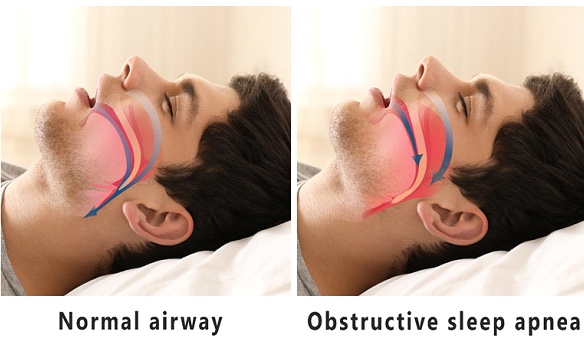Obstructive Sleep Apnea – Eugene, OR
A Common
but Dangerous
Sleep Disorder

According to some estimates, 22 million Americans suffer from obstructive sleep apnea (OSA). However, it is impossible to know how many people have this condition because a large percentage of cases remain undiagnosed for years. What exactly is OSA, why is it so dangerous, and when should you visit a doctor to find out if you have it? In the sections that follow, you will learn the answers to these important questions about obstructive sleep apnea.
Obstructive Sleep Apnea Overview

There are two types of sleep apnea. Both of them are characterized by repeated pauses in breathing throughout the night. Central sleep apnea occurs when the brain fails to send the proper signals to cause the body to breathe. Obstructive sleep apnea is the more common form of the disorder. In OSA, the pauses in breathing occur when tissues in the upper airway hinder the free flow of air. A person with OSA may stop breathing dozens or even hundreds of times each night.
What Causes Obstructive Sleep Apnea?

There are quite a few possible causes of OSA. Some of the most common are:
- Excess fat. Extra body fat, especially around the neck, can lead to obstructions in the upper airway. Men with a neck circumference of more than 17 inches and women with a neck circumference of more than 16 inches are at a high risk of developing OSA.
- Anatomical abnormalities. Enlarged tonsils or adenoids can interfere with airflow.
- Smoking irritates the tissues in the throat and can easily worsen OSA.
- Nasal congestion. If you find it difficult to breathe through your nose, whether because of chronic allergies or other problems, you are at an increased risk of OSA.
Complications of Obstructive Sleep Apnea

OSA can contribute to a number of immediate and long-term complications, including:
- Slowed reaction times. OSA interferes with the sleep cycle and can slow down your reaction times, which increases the likelihood that you will be involved in a motor vehicle accident.
- Interference with daily activities. Individuals with OSA are more likely to suffer from mood disorders and sexual dysfunction.
- Cardiovascular health issues. OSA increases the risk of heart attack, stroke, and other serious problems.
- Weight gain. Weight gain can contribute to OSA, but the reverse is also true. OSA can lead to unwanted weight gain because sleep deprivation increases cravings for high-calorie foods.
When You Should See a Doctor About Obstructive Sleep Apnea

If your partner has told you that you snore loudly, or you always feel tired, these are signs that you may be suffering from OSA. Instead of ignoring the problem, visit a qualified doctor and ask for a sleep test. A sleep test will monitor your breathing and other vital statistics for a night. It will reveal if you have OSA and how severe the problem is. Then, you can begin to consider your treatment options.
Dr. Paskalev offers oral appliance therapy, which uses a mouthguard-like device to slightly reposition the jaw at night to facilitate uninterrupted breathing. Oral appliance therapy is a more comfortable, more convenient way to fight OSA than a CPAP machine, which is the most commonly prescribed OSA treatment.
What is Sleep Apnea? Oral Appliance Therapy Types of Oral Appliances What We Do

